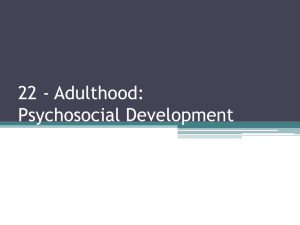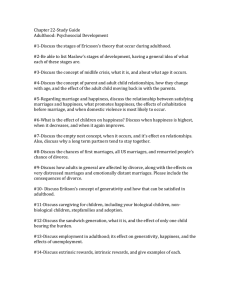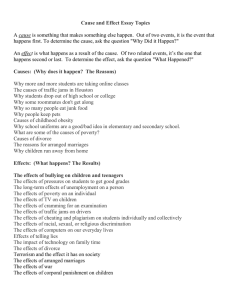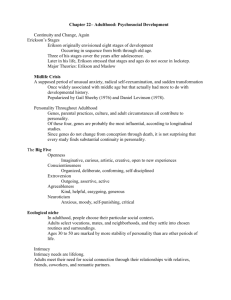Adulthood: Psychosocial Development How will marriage, divorce, children and coping with your
advertisement
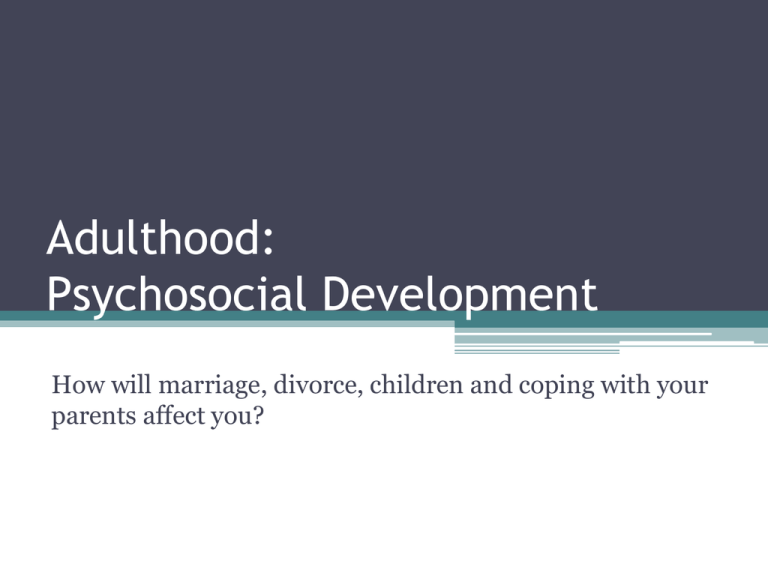
Adulthood: Psychosocial Development How will marriage, divorce, children and coping with your parents affect you? Continuity and Change What changes? What stays the same? What is happening in the major theories? • Erikson’s Stages ▫ Intimacy vs. Isolation ▫ Generativity vs. stagnation • Maslow’s stages ▫ ▫ ▫ ▫ ▫ 5. Self-=actualization 4. Success and esteem 3. Love and belonging 2. Safety 1. Physiology What is the midlife crisis? • 40’s - What have I accomplished? • Anxiety, self-reexamination, transformation • Related more to developmental history than age Intimacy How do we meet our need for intimacy? • Met by: family, friends, coworkers, & romantic partners (the social convoy) Do you remember? • Which of Erikson’s stages is this person in? • What are Maslow’s stages? • What can create a midlife crisis? What happens to family bonds? Parent-Adult child relationships • Improves with age (Generations become closer) • May deteriorate if they live together • Familism ▫ Belief that family members should support each other Family bonds: Will you find a committed partner? Does marriage produce happiness? • Married people (In satisfying marriages) ▫ Happier, Healthier, Richer • Learning to understand and forgive each other promotes happiness • Cohabitation before marriage ▫ Decreases happiness • Domestic violence is most likely to occur early in a relationship Do children produce happiness? • Children and happiness (“U” shaped curve) ▫ Happiness is highest before children ▫ Decreases with birth of first child & additional children ▫ Decreases again when children reach puberty Teenage years ▫ Happiness improves after child raising years when children become more independent (Empty nest) Empty nest: What happens when the children leave home? • Improves relationships ▫ Parents are alone again ▫ More money available • Longtime partners ▫ Stay together because of love & trust Do you remember? • What happens to parent – child relationships as the children mature? ▫ What can cause this relationship to deteriorate? • What promotes happiness in good marriages? • When is domestic violence most likely to occur? • How does a couple’s happiness change after the children leave home? Why? What is the effect of separation and divorce? • Almost 1 out of 2 marriages ends in divorce in the U.S. ▫ About 1/3 of all first marriages end in divorce ▫ Remarried people have a greater chance of divorce than first marriages • Very distressed marriages = happier after divorce What are the consequences of divorce? • Can last for decades • Divorce reduces income, severs friendships, and weakens family ties • Income, family welfare, and self-esteem = lower among formerly married than still married or never married Generativity: How can you deal with this stage? • Erikson’s “Generativity vs. Stagnation ▫ Satisfied by Creativity Caregiving Employment How do you care for children? • Your biological children ▫ Parent must change to adopt to developmental stages of child. • Non-biological Children ▫ Children without emotional attachment become mistrustful and fearful of becoming too dependent • Stepfamilies ▫ Patient, authoritative parenting is needed • Adoption ▫ Biological parents usually absent ▫ Desperately want a child How do you care for your aging parents? • Sandwich generation ▫ Sandwiched between their children and their parents • Often only one child bears the burden of caregiving ▫ Creates resentment Employment What work do you want? Employment = generativity • Unemployed = higher rates of child abuse, alcoholism, depression & other problems. • Happiness is not necessarily related to income • For work to meet generativity needs, it must: ▫ Use personal skills ▫ Be creative ▫ Advise coworkers as a friend or mentor Why do people work? • Extrinsic rewards (Outside - External) ▫ Salary ▫ Health insurance ▫ Pension • Intrinsic rewards (Inside – internal) ▫ ▫ ▫ ▫ ▫ Intangible rewards Job satisfaction Self-esteem Pride in contributing Feeling needed Apple Computer Can you combine intimacy and generativity? • Job satisfaction depends on ▫ The job ▫ Home situation ▫ Ability to balance home and work Do you remember? • Do second marriages have a greater chance of success than first marriages? • Do formerly married persons have higher income and self-esteem than currently married or never married? • What is the sandwich generation? • What is the difference between extrinsic and intrinsic rewards? ▫ Give an example of each
